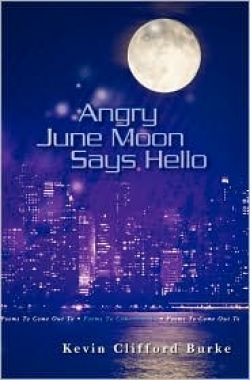Angry June Moon Says Hello
Poems to Come Out To
Creating a history and legacy that can be passed on to successive generations is a function of community, and most social groups, including minorities within the larger society, do this openly and freely. The gay community, however, because of the nature of its distinction, has long been treated as an outcast in American society; its history has been obscured and its members forced to remain hidden in order to survive. Until recently, gay youth had to face all the difficulties of mainstream-culture youth, with the added burden of having no one in whom to confide, no elders after whom to pattern one’s life, and no history from which to learn pride and courage.
The life story and poetry of Kevin Clifford Burke demonstrate the pain, suffering, and alienation that such a situation can cause. From early childhood, Burke expressed a sensibility and sensitivity different from that of his family members and peers. His poems reveal the struggles of a young homosexual man trying to come to terms with his sexuality and find his place in a family, community, and church that all reject him; childhood abuse, severe depression, attempts at living in Catholic religious orders, and the healing effects of analysis serve as subjects. But the poems also speak of gay sensibility and eroticism, and the transcendent joy of finally finding one’s people, one’s love, and the purpose of one’s life. An especially poignant example is “Miguel and Me and the Shadows,” in which the poet speaks of how the nearness of the beloved brings him the steadiness and courage he needs to touch the fearsome shadows with which his world had been filled:
Your presence is still near
As our laughter arises into the night
To melt the frozenness
Of the insatiably dark years…
And later, in the same poem, he asks if the passing of time, and its tests, will diminish or strengthen their love:
Or will it enflame the passing time
With hardened gleaming souls of treasure stored,
Warmed by the coals of love
And pressured with the testing endurance of wills
That seeks and enlivens the seeking
To carbonize the embittered embers
Into diamonds?
There is passion, pain, and ecstatic joy in Burke’s poetry, and free verse carries it well; yet at times the rhythm can stumble, and ambiguous word usage, or use of a newly-coined word (“un-beware” in “Me and Miguel and the Shadows”) creates confusion and stops a poem’s flow. Burke seems to enjoy internal rhyme, and his poems benefit from the movement it creates, but its use is inconsistent and it is not obvious whether the inconsistency is intended or unconscious.
Crafting a tightly-knit poem that flows from beginning to end in a way that feels inevitable to a reader is supremely difficult, and requires an objectivity that a poet alone may not have. Deeper study of the craft through books, workshops, or consultation with experts, coupled with the ability to be ruthless and untiring in revision would take Burke’s deeply expressive poems to a higher level of artistry.
Reviewed by
Kristine Morris
Disclosure: This article is not an endorsement, but a review. The publisher of this book provided free copies of the book and paid a small fee to have their book reviewed by a professional reviewer. Foreword Reviews and Clarion Reviews make no guarantee that the publisher will receive a positive review. Foreword Magazine, Inc. is disclosing this in accordance with the Federal Trade Commission’s 16 CFR, Part 255.

